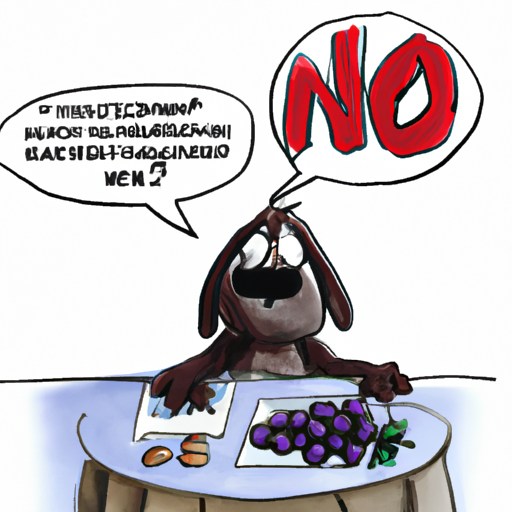As a caregiver, you want the best for your furry friend. You ensure they get regular exercise, plenty of playtime, and the best possible diet. However, it’s important to know that not all human foods are safe for dogs. Some can cause minor digestive issues, while others can lead to serious health problems or even death.
1. Chocolate
Chocolate is one of the most well-known foods that can be harmful to dogs. It contains theobromine and caffeine, both of which can be toxic to your pet.
- Milk chocolate: can cause diarrhea and vomiting in small amounts. Large amounts can lead to seizures or even death.
- Dark chocolate and baking chocolate: even more dangerous as they contain higher levels of theobromine.
2. Grapes and Raisins
While the exact reason is still not clear, grapes and raisins can cause kidney failure in dogs. Even small amounts can make a dog ill.
- Symptoms: vomiting, lethargy, and depression.
3. Onions and Garlic
These common kitchen ingredients can cause gastrointestinal irritation and could lead to red blood cell damage in dogs.
- Cooked or raw: both forms are harmful.
- Symptoms: weakness, breathlessness, and vomiting.
4. Alcohol
Dogs react to alcohol much like humans do, but it takes far less to do its damage. Alcohol can cause vomiting, diarrhea, decreased coordination, central nervous system depression, difficulty breathing, tremors, abnormal blood acidity, coma, and even death.
5. Caffeine
Caffeine is extremely harmful to dogs and can lead to restlessness, rapid breathing, heart palpitations, muscle tremors, and fits.
- Source: coffee, tea, energy drinks, and some cold medicines and pain killers.
6. Avocado
Avocado contains persin, a toxin that can cause vomiting and diarrhea in dogs. Also, the pit can lead to bowel obstruction if swallowed.
7. Xylitol
Xylitol is a sweetener used in many products, including gum, candy, baked goods, and toothpaste. It can cause insulin release in most species, leading to liver failure.
- Symptoms: vomiting, loss of coordination, and seizures.
8. Dairy Products
Some dogs have no problem digesting milk and dairy products. Yet, others can experience various symptoms of food intolerance like gas, diarrhea, or vomiting if they consume any type of dairy product.
| Unsafe Food | Symptoms | Severity |
|---|---|---|
| Chocolate | Diarrhea, vomiting, seizures | High |
| Grapes, Raisins | Vomiting, lethargy, depression | High |
| Onions, Garlic | Weakness, breathlessness, vomiting | Medium |
| Alcohol | Vomiting, diarrhea, decreased coordination | High |
| Caffeine | Restlessness, rapid breathing, heart palpitations | High |
| Avocado | Vomiting, diarrhea | Medium |
| Xylitol | Vomiting, loss of coordination, seizures | High |
| Dairy Products | Gas, diarrhea, vomiting | Medium |
FAQ’s
Can dogs eat chocolate?
No, chocolate is toxic to dogs and can cause severe health problems.
Are grapes and raisins harmful to dogs?
Yes, even in small amounts, both can lead to kidney failure in dogs.
Can dogs eat onions and garlic?
No, both can cause gastrointestinal irritation and could lead to red blood cell damage.
Can dogs drink alcohol?
No, even small amounts of alcohol can lead to serious health problems in dogs.
Is caffeine safe for dogs?
No, caffeine is extremely harmful to dogs.
Can dogs eat avocado?
It’s best to avoid feeding your dog avocado as it contains a toxin that can cause vomiting and diarrhea.
Is xylitol safe for dogs?
No, xylitol can cause liver failure in dogs.
Can dogs eat dairy products?
Some dogs might tolerate dairy products, while others can experience symptoms of food intolerance, such as gas, diarrhea, or vomiting.



